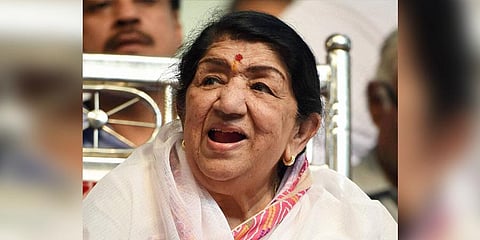

Every time I have passed by Pedder Road in my 19 years in Mumbai, I have turned to look at a house on the first floor of a building called Prabhu Kunj which almost every taxi driver worth his Mumbai salt points out -- either with awe or anger. "That's Lata Mangeshkar’s house," the angry ones would say, 'it's because of her that a flyover has not been built here and we're stuck in this jam."
But the drivers I lean towards are those who say, "There's Lata didi's house; the only woman in the country powerful enough to stop the construction of a flyover for nearly three decades." "Not country," I'd chime in, "perhaps the only woman in the world."
Lata Mangeshkar has been given every award possible. Yet, to me the most important is the awe I hear in the voices of common people, like the drivers who point to her house with pride, unlike the indifference they show towards the 27-storeyed Ambani residence barely a few hundred meters away. It is also astounding that successive Maharashtra governments across party lines - in a city so in a rush - have refused to clear the Pedder road bottleneck by building a flyover since it was first proposed in 1995.
Lata didi, as she's fondly known in the industry and on the streets of Mumbai, is a lot of things to a lot of people. For me though, the little stories and comments I've heard about her on the streets, in parties, and in private conversations all my life are more important.
My parents never tire of telling me how Pandit Nehru wept and called her beti after she sang Ae mere watan ke logo. As a writer myself, I'd complain it's the lyrics by Pradeep that move people. But my parents would challenge me to sing it and claim that even our leaky tap would stop shedding tears hearing my rendition.
I'd later realise another reason why my parents also liked her: because she had also sung in Assamese. Mom particularly loves one she sang with Bhupen Hazarika that goes jonak or e rati, oxom or e mati, jiliki jiliki pore translated to – 'on moonlit nights, the soil of Assam, shines bright'.
I realise it is the same with Lata and Hindi. In her interviews I've heard since I moved to Mumbai and got soaked deep in Marathi culture and language, I've never failed to glean hints of a Marathi accent. Hindi wasn't Lata’s first language. Neither were 34 others -- both Indian and foreign -- that she sang in. But it didn't matter to her, or her listeners.
Lata matched voices with male singers of four different generations in works that jumped from one millennia to our new one. My father's generation used her songs to woo lovers as much as I did or the generation after me is doing. Calling her an institution then is but an understatement.
Hence, the best compliment to me came from an uncle from my childhood. An amateur musician, he'd say, "If there were nine notes in the Indian musical tradition the last two after Sa, Re, Ga, Ma, Pa Dha, Ni would be called La and Ta."
For me, like Nehru and hundreds of millions of other Indians, there's also a patriotic connection. As the mood came over my family, particularly on January 26th and August 15th, we'd blare Lata's patriotic songs on full blast. Be it Ae mere watan ke logo or the 23-year-old Lata's rendition of Vande Mataram from Anand Math or those she sang with another perennial youth icon, A R Rehman.
I would later learn the date Lata had brought Nehru to tears: January 27, 1963. I would also learn that exactly 51 years later, PM Narendra Modi would also try to have her sing for him. From the first PM of India to the first Indian PM to be born post-independence, 13 other Prime Ministers would come and go. In that time, she'd sing for thousands of films, and 36 Indian and foreign languages.
What else would you expect of a singer, the gap of years between whose first and last recorded song is over 75 years – more than the lifespan of most people in the world. I personally don't know of any global singer who has been so prolific that for a decade the talks of her 'last song' has been doing the round, lately in the university of WhatsApp.
Perhaps her musical longevity has something to do with how they recorded songs in the analog days: with a full orchestra where a single minor mistake by anyone meant they'd have to start the whole thing again. A single song could take weeks to record.
I had not been in the recording studios then, but I have been in many recently where singers record line by line and if needed, word by word, and the whole song would be pasted together from multiple retakes on a computer. The first time the singer sings the entire song, is perhaps during live performances, the reason why many of them love it.
In the beginning there was the word. And the word was but a musical note. And the ones who wielded it with six others, held power over the masses. Now that the wielder of that power is gone, the Pedder road flyover will perhaps finally be built. But as long as the generation of drivers and passengers who have lived Lata's songs last, we would turn to look at the small first floor abode of a tiny woman, whose voice will ring through eternity.